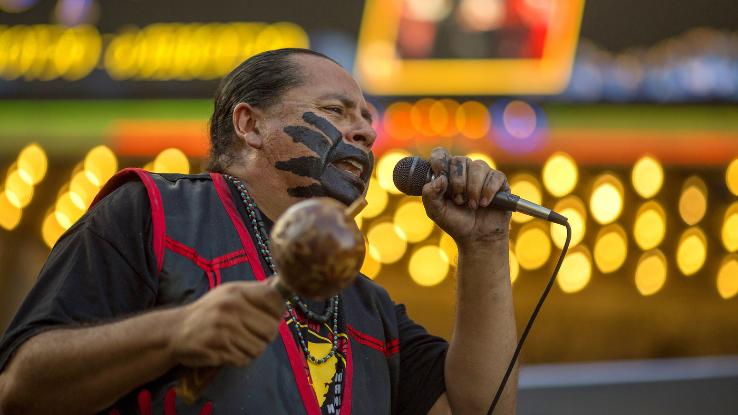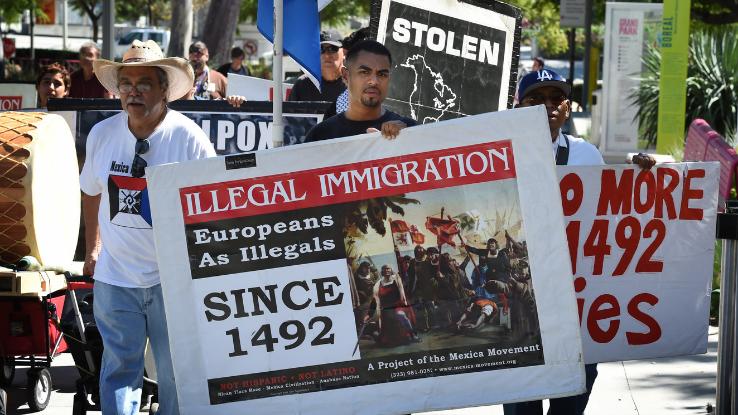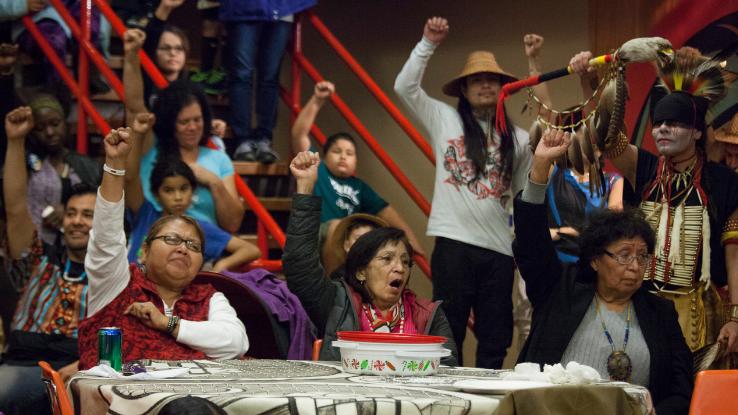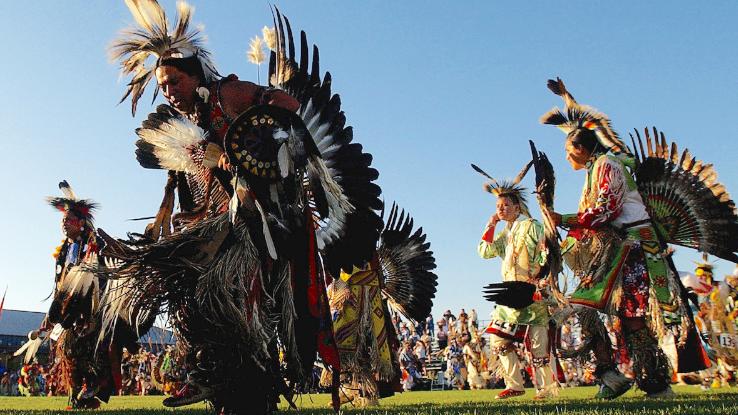Funny Columbus Day Cartoon Called the Landing

With racial justice at the forefront of our collective consciousness, there has arisen a growing outcry for Americans to reexamine the legacy of Christopher Columbus. Once a celebrated pioneer in America's discovery, he has come into the spotlight again in relation to the debate over the history of systemic racism in the United States. This has led to the toppling of several Columbus statues across the country. The general public and city officials are also dumping Columbus Day to formally recognize Indigenous Peoples' Day, to show solidarity with Native American communities and to course-correct the narrative about what really happened hundreds of years ago.
While the U.S. has celebrated Columbus Day since 1792, the notion to replace it started in the 1970s. But the momentum to remove Columbus Day has intensified each year, and there are many reasons why Native Americans and others are fighting for this change — and celebrating it.
Why Indigenous Peoples' Day and Columbus Day Are Important to Different Groups
Most Americans used to celebrate Columbus Day to honor his voyage to the Americas. But the holiday means much more to Italian Americans. The day goes beyond the explorer; it symbolizes the Italians' long journey to a new land. Before and during the time period when Columbus Day was established, Italians experienced religious and ethnic hatred, so Italian Americans supported formalizing the holiday to honor a famous Italian as they sought acceptance and inspiration. According to New York's Columbus Citizen Foundation, Columbus Day is celebrated for "the spirit of exploration, the struggles and triumphs of immigrants who helped build the United States, and the vibrant heritage and cultural wealth of the Italian-American community."

Columbus was often credited with discovering the New World and opening the doors for European exploration and colonization. However, an increasing number of states and cities have tossed out Columbus Day after questioning his legacy and public outcry over his "crimes against humanity" has grown. For many Indigenous communities, he was a European explorer who enslaved thousands of Native Americans, caused disease outbreaks as a result of his presence and led a horrifying genocide that almost wiped out Indigenous populations.
Instead of honoring Columbus, many have proposed to celebrate Indigenous Peoples' Day, which honors Native Americans, their history, their culture and their strength in the face of Columbus' and other explorers' violence. In September 2020, Arizona State Senator Jamescita Peshlakai described the holiday as "an opportunity to move the conversation forward and to start really working on the inclusion of Native Americans in every part of American life and opportunity."
In 2019, Wisconsin Governor Tony Evers shared that European exploration and the country's government have long hurt Native Americans, saying, "Native Americans in Wisconsin and throughout our country have suffered unjust treatment — often at the hands of our government — and [Indigenous Peoples' Day] is about recognizing that Wisconsin would not be all that it is without Indigenous people."
When the Idea to Remove Columbus Day Gained Momentum
In the wake of summer 2020's anti-racism protests, Columbus' legacy of enslavement and genocide sparked discussions across the country about exactly what the explorer represents and why. Many Columbus statues were taken down or vandalized as more people began to view him as a symbol of the systemic racism that's been long overdue for reexamination.

Dropping Columbus Day was first proposed by the International Indian Treaty Council during a 1977 United Nations conference about the discrimination Native populations have faced in America. However, no action was taken until 1989, when South Dakota became the leading state to change the holiday's name to Native American Day. The state's governor, George S. Mickelson, worked with newspaper publisher Tim Giago to resolve historically bad relations between Native Americans and whites. Giago suggested removing Columbus Day to mark the 100th Anniversary of the Massacre at Wounded Knee in 1990 — the year of reconciliation.
Two years later, Berkeley, California, became the first U.S. city to officially switch the holiday to Indigenous Peoples' Day. The Bay Area Indian Alliance asked Berkeley Mayor Loni Hancock to make the change to protest Europe's violent conquest of North America. A long list of states and cities followed the action in the 2010s, from Michigan to the District of Columbia. Some places observe Indigenous Peoples' Day under a different name, such as American Indian Heritage Day in Alabama.
Where Indigenous Peoples' Day Is Celebrated
Many states and cities now honor Indigenous Peoples' Day on the second Monday of October in lieu of Columbus Day. Cultural events, vigils to recognize the genocide and healing meetings are some of the ways different groups celebrate Indigenous Peoples' Day. Some states and cities encourage their residents to donate to a local tribe and engage in conversations about the mistreatment and suffering of Indigenous people at the hands of colonizers.

For instance, Berkeley holds a pow wow and festival each year on Indigenous Peoples' Day. Since the city established the holiday, it has also developed programs in schools, libraries and museums to honor and appreciate Native American history and culture.
Some states and major cities that celebrate Indigenous Peoples' Day include the following:
States:
- Vermont
- Maine
- New Mexico
- Alaska
- South Dakota
- Oregon
- Louisiana
- Michigan
- Wisconsin
- North Carolina
- Iowa
- Washington D.C.
- Minnesota
- Hawaii (Discoverers' Day)
Major Cities:
- Los Angeles, CA
- Seattle, WA
- Minneapolis, MN
- Denver, CO
- Eugene, OR
- Ithaca, NY
- Newark, NJ
- Tulsa, OK
- Cambridge, MA
- San Francisco, CA
- Durham, NH
- Salt Lake City, UT
- Nashville, TN
- Madison, WI
- Princeton, NJ
- Spokane, WA
- Grand Rapids, MN
- St. Paul, MN
- Phoenix, AZ
- Albuquerque, NM
- Santa Fe, NM
- Portland, OR
- Carrboro, NC
- Asheville, NC
- Amherst, MA
- Northampton, MA
- Harpers Ferry, WV
- Austin, TX
However, Indigenous Peoples' Day isn't recognized everywhere, and it remains a federal holiday. Some places have declined the proposal, including a northern New Jersey town that as recently as 2019 voted not to replace the holiday, citing its importance to Italian Americans. Many areas continue celebrating Columbus Day, with major parades usually held in Cleveland, Pittsburgh and New York City.
Although the movement for officializing Indigenous Peoples' Day has led to state-level changes across the country, there are still many places that recognize Columbus Day. But the movement to reconsider Columbus' legacy in American history is growing, and the current trend of changing the holiday says a lot about the direction the country is heading in. More people are re-evaluating who or what they believe is worth celebrating. This is important because it empowers mistreated groups, giving them a voice and the recognition in American history they rightly deserve.
Source: https://www.ask.com/culture/indigenous-peoples-day-columbus-day?utm_content=params%3Ao%3D740004%26ad%3DdirN%26qo%3DserpIndex
0 Response to "Funny Columbus Day Cartoon Called the Landing"
Post a Comment